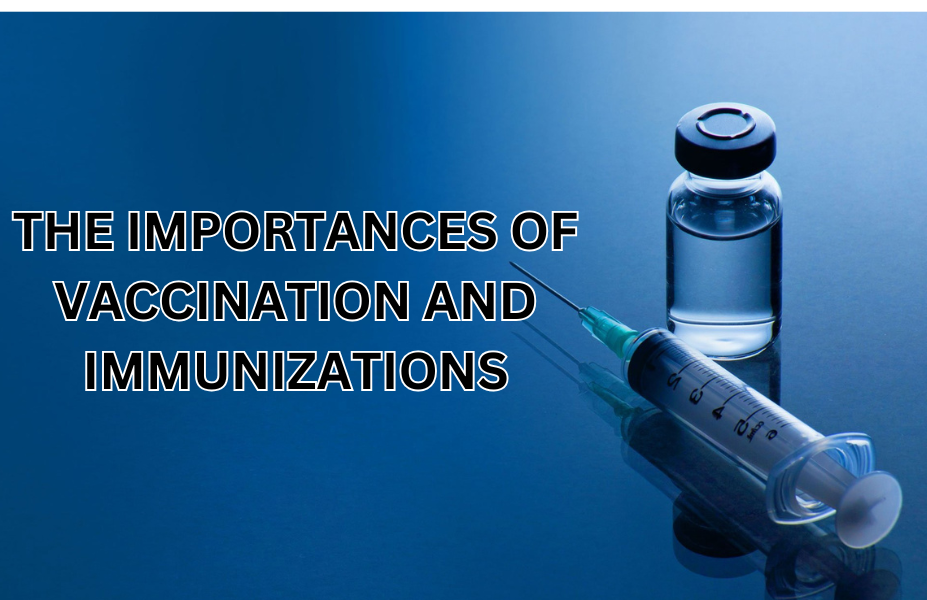Vaccinations and immunizations play a crucial role in protecting both individual and public health they are among the most effective ways to prevent serious diseases and infections saving millions of lives every year vaccines work by stimulating the immune system to recognize and fight specific pathogens such as viruses or bacteria without causing the illness itself by getting vaccinated individuals reduce their risk of contracting and spreading diseases helping to create herd immunity this means that when a large percentage of a population is immune to a disease it becomes much harder for that disease to spread even among those who are not vaccinated.
Immunizations have been instrumental in controlling and even eliminating deadly diseases like polio and smallpox in addition to protecting individuals vaccinations are vital for safeguarding vulnerable groups such as infants the elderly and people with weakened immune systems who may not be able to receive certain vaccines themselves as new diseases emerge vaccinations remain a critical tool in the fight against outbreaks and pandemics vaccines are a powerful and cost-effective way to maintain public health reduce the burden of disease and protect future generations from preventable illnesses.
Benefits Vaccinations and Immunizations:
Vaccinations and immunizations offer a wide range of benefits both for individuals and for society as a whole one of the main advantages is that they protect individuals from potentially serious and life-threatening diseases such as measles, polio and influenza by boosting the immune system vaccines help prevent infections before they can take hold reducing the risk of complications and long-term health issues vaccines are especially important for vulnerable groups such as young children the elderly and people with weakened immune systems as they are more susceptible to severe outcomes from certain diseases.
Which occurs when a significant portion of the population is vaccinated making it harder for diseases to spread this not only protects those who are vaccinated but also helps safeguard those who cannot be vaccinated like newborns or individuals with allergies to certain vaccine ingredients vaccinations also reduce healthcare costs by preventing the spread of diseases and minimizing the need for costly treatments and hospitalizations immunizations have helped eliminate or drastically reduce the prevalence of some deadly diseases such as smallpox and polio improving global health outcomes.
Types of Vaccination and Immunization:
There are several types of vaccinations and immunizations each designed to protect against different diseases and conditions the most common types include contain viruses or bacteria that have been killed making them safe but still able to stimulate an immune response examples of inactivated vaccines include the polio vaccine and the hepatitis a vaccine on the other hand use weakened forms of live viruses or bacteria these vaccines closely mimic the actual infection and often provide long-lasting immunity.
The MMR (measles, mumps, and rubella) vaccine is a well-known example use parts of the pathogen such as proteins or sugars to stimulate an immune response without using the whole virus or bacteria examples include the human papillomavirus (HPV) vaccine and the type vaccine are made from toxins produced by bacteria which are modified to be harmless but still able to provoke immunity the diphtheria and tetanus vaccines are examples of toxoid vaccines each type of vaccine is designed to target specific pathogens and is an important tool in preventing infectious diseases ensuring better health outcomes globally.
Common vaccinations and Immunizations:
There are several common vaccinations and immunizations that help protect people from a variety of serious diseases some of the most widely known and recommended vaccines include the MMR vaccine (measles, mumps, and rubella) which protects against three contagious viral diseases that can lead to severe complications including brain damage the DTP vaccine (diphtheria, tetanus, and pertussis or whooping cough) is another important immunization protecting against bacterial infections that can cause breathing problems paralysis and death the FLU vaccine recommended every year helps protect against seasonal influenza which can be especially dangerous for young children the elderly and those with weakened immune systems.
Vaccine protects against a liver infection caused by the hepatitis B virus which can lead to chronic disease and liver cancer the HPV vaccine (human papillomavirus) is recommended for both boys and girls and protects against several strains of the virus that can lead to cervical cancer as well as other cancers and genital warts the polio vaccine is critical for preventing polio a disease that can cause permanent paralysis or even death against chickenpox a highly contagious disease that can lead to serious complications in certain people these common vaccinations are essential tools in preventing the spread of disease protecting individuals and promoting public health.
Adult Vaccinations:
Adult vaccinations are an important part of maintaining long-term health and preventing serious illnesses while children typically receive most of their vaccinations early in life adults also need to stay up to date with certain immunizations annually for everyone as influenza can lead to severe complications especially in older adults or those with underlying health conditions the advised for adults particularly if they have never received it as an adult or if it been more than ten years since their last dose this vaccine helps protect against potentially life-threatening bacterial infections which protect against pneumonia and other respiratory infections are recommended for older adults or those with certain chronic illnesses.
They are at higher risk for complications recommended for adults aged 50 and older to prevent shingles a painful skin rash caused by the reactivation of the chickenpox virus may be recommended for adults who are at higher risk for exposure such as those with certain health conditions or those traveling to areas with high rates of these infections staying current with adult vaccinations is essential to prevent preventable diseases reduce healthcare costs and protect both the individual and the community.
